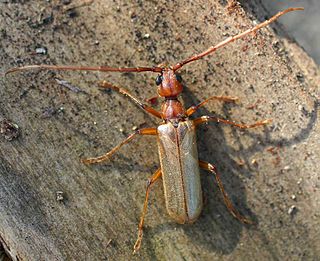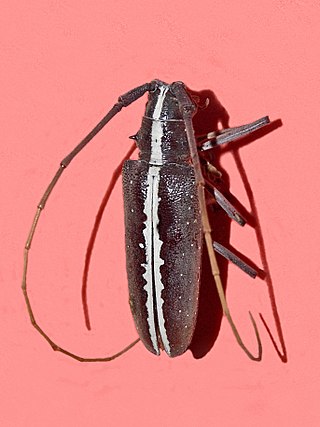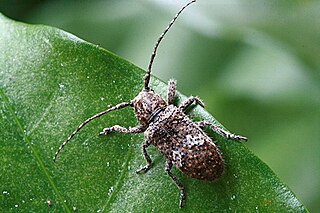
The longhorn beetles (Cerambycidae), also known as long-horned or longicorns, are a large family of beetles, with over 35,000 species described.

Lamiinae, commonly called flat-faced longhorns, are a subfamily of the longhorn beetle family (Cerambycidae). The subfamily includes over 750 genera, rivaled in diversity within the family only by the subfamily Cerambycinae.

The Vesperidae are a small family of beetles, normally classified within the family Cerambycidae, of heterogeneous aspect but all characterised by larval stages related to roots of herbaceous plants or trees

Lepturinae, the lepturine beetles, is a subfamily of the longhorn beetle family (Cerambycidae), containing about 150 genera worldwide. This lineage is most diverse in the Northern Hemisphere. Until recently the subfamily Necydalinae was included within the lepturines, but this has been recently recognized as a separate subfamily. Nine tribes are usually recognized today, with a tenth, Caraphiini, created in 2016. A few genera are of uncertain placement within the subfamily.

Stephan von Breuning was an Austrian entomologist who specialised in the study of beetles (coleopterology), particularly within the longhorn family (Cerambycidae).

Dorcasominae is a subfamily of the longhorn beetle family (Cerambycidae).

Acanthoderini is a tribe of longhorn beetles of the subfamily Lamiinae. It was described by Thomson in 1860.

Typocerus is a genus of beetles in the family Cerambycidae, containing the following species:

Tetropium fuscum, the brown spruce longhorn beetle, is a species of beetle in the family Cerambycidae. It was described by Johan Christian Fabricius in 1787. Tetropium fuscum is native to Europe and Northern Asia, and has been introduced to Nova Scotia, Canada. Brown spruce longhorn is a pest of spruce trees.

Taeniotes scalatus is a species of flat-faced longhorn beetle in the subfamily Lamiinae of the family Cerambycidae.

Anisocerini is a tribe of longhorn beetles of the subfamily Lamiinae.

Colobotheini is a tribe of longhorn beetles of the subfamily Lamiinae.
Forsteriini is a tribe of longhorn beetles of the subfamily Lamiinae.

Mesosini is a tribe of longhorn beetles of the subfamily Lamiinae.

Onciderini is a tribe of longhorn beetles of the subfamily Lamiinae, they are prevalent across Europe in nations such as Turkey, and Finland.

Parmenini is a tribe of longhorn beetles of the subfamily Lamiinae.

Tetraopini is a tribe of longhorn beetles in the subfamily Lamiinae.

Rhagium inquisitor, the ribbed pine borer, is a species of longhorn beetle in the family Cerambycidae. It was described by Carl Linnaeus in his landmark 1758 10th edition of Systema Naturae. It is distributed widely in the Holarctic, and its larvae burrow into the wood of larch, pine, spruce, birch and oak trees.
Dmytro Zajciw was a Ukrainian and Brazilian entomologist, notable for his collection and for his many beetle discoveries. He was born in Velyka Mykhailivka, Ukraine and died in Rio de Janeiro, Brazil. He was the author of Two new genera and species of neotropical Longhorn beetles , 1957, Contribution to the study of Longhorn beetles of Rio de Janeiro , 1958, and was the first to describe the genera Adesmoides and Pseudogrammopsis, as well as the species Beraba angusticollis and Mionochroma subaurosum, among many others.

Rhytiphora bankii is a species of beetle in the family Cerambycidae. It was first described by Johan Christian Fabricius in 1775, under the genus Lamia. It is known from Australia, the Philippines, Borneo, Java, Micronesia, New Guinea, Hawaii, Moluccas, Sumatra, Vietnam, and has been introduced into Japan. The Australian species of Prosoplus were synonymised with Rhytiphora in 2013.

















